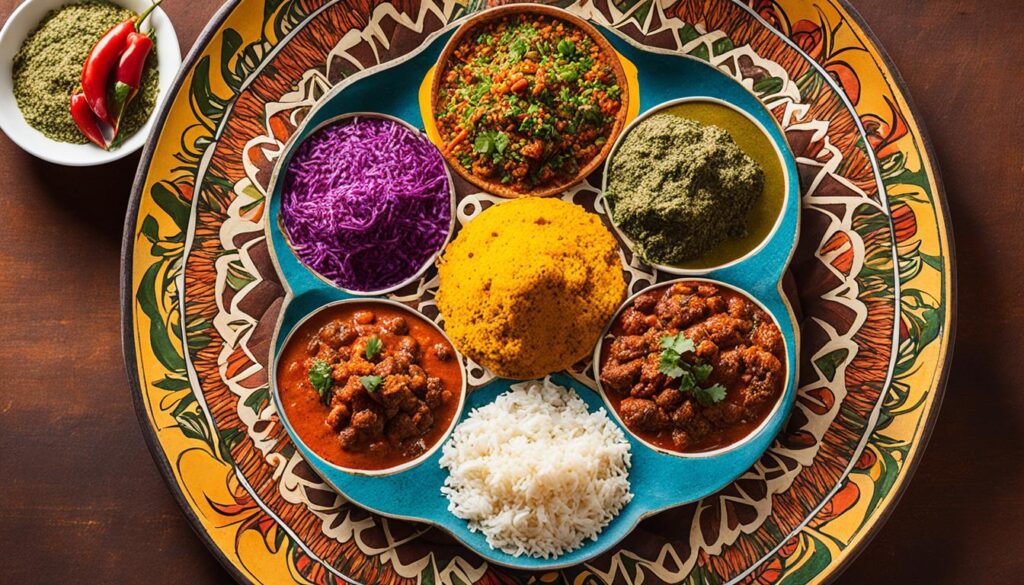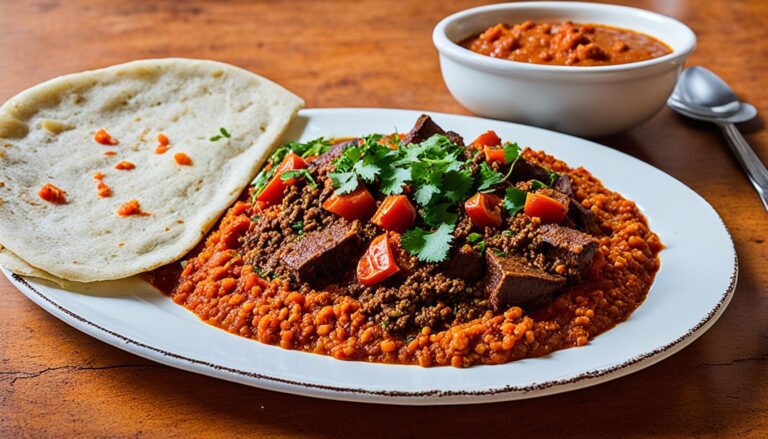Is Ethiopian Food Salty?
Welcome to our culinary exploration of Ethiopian cuisine! Today, we invite you to join us as we dive into the vibrant world of Ethiopian dishes, where flavors come alive and culinary traditions run deep. But let’s start with a burning question: Is Ethiopian food inherently salty? We challenge common beliefs and unravel the essence of Ethiopian cuisine, discovering the delicate balance of flavors that make it truly unique.
Key Takeaways:
- Ethiopian cuisine offers a remarkable array of flavors.
- Some Ethiopian dishes can be on the saltier side, but it varies.
- The true essence of Ethiopian cuisine lies in achieving a balance of flavors.
- Ethiopian dishes are made with unique traditional ingredients.
- Exploring Ethiopian cuisine is a journey worth taking.
The Flavors of Ethiopian Cuisine
Ethiopian food is renowned for its bold and diverse flavors. Traditional Ethiopian dishes are packed with an array of spices, herbs, and aromatic ingredients that bring depth and complexity to the cuisine. The combination of these flavors creates a unique and unforgettable taste experience.
One of the key elements of Ethiopian cuisine is the use of spices. The country’s rich history and trade routes have influenced the variety of spices used in their dishes. From fiery berbere, a blend of chili peppers, garlic, ginger, and spices, to earthy mitmita, a mix of chili peppers, cardamom, and cloves, the spices used in Ethiopian cooking are a testament to the country’s vibrant culinary heritage.
Herbs also play a significant role in Ethiopian cuisine. Fresh herbs like parsley, coriander, and basil are used to add a refreshing and aromatic touch to dishes. These herbs not only enhance the flavors but also contribute to the vibrant colors and visual appeal of Ethiopian meals.
The aromatic ingredients used in Ethiopian food, such as garlic, ginger, and onions, infuse the dishes with a fragrant and enticing aroma. The combination of these aromatics with the spices and herbs creates a symphony of scents that can be detected even before taking the first bite.
Whether you’re savoring the tangy flavors of injera, the national Ethiopian bread, or indulging in the rich and hearty stews like doro wat and kitfo, the flavors of Ethiopian cuisine will transport you to a world of culinary delights.
The Salty Side of Ethiopian Dishes
While exploring the vibrant world of Ethiopian cuisine, we cannot escape the fact that some dishes can lean towards the saltier side. Seasoning and salt play a significant role in Ethiopian cooking, adding depth and enhancing the flavors. However, it is important to note that the level of saltiness can vary from dish to dish, offering a diverse taste experience.
Ethiopian food utilizes a variety of seasonings and spices, including the renowned Ethiopian blend called “berbere,” which typically contains chili peppers, garlic, ginger, and other aromatic ingredients. Additionally, the use of salt in Ethiopian cuisine helps to balance and intensify the flavors, creating a harmonious taste profile.
One of the reasons behind the saltier aspect of Ethiopian food lies in its cultural and historical context. Salt has been a valuable and essential ingredient in Ethiopian cooking for centuries, not only for its flavor-enhancing properties but also for its preservative qualities. Historically, salt played a crucial role in preserving food in a time when refrigeration was not available.
It’s interesting to note that the saltiness of Ethiopian dishes can also vary depending on regional differences and personal preferences. In northern Ethiopian cuisine, for example, the food is generally milder and less salty compared to other regions.
Overall, the salty side of Ethiopian dishes adds a distinct and captivating dimension to the cuisine. The careful combination of seasonings, spices, and salt results in a rich, flavorful experience that continues to delight food enthusiasts around the world.
The Impact on Flavor Profile
The use of salt in Ethiopian food goes beyond simply adding a salty taste. It plays a crucial role in balancing and elevating the overall flavor profile. The salt used in Ethiopian cooking enhances the natural flavors of the ingredients, allowing the spices and seasonings to shine through.
Moreover, the correct amount of salt in Ethiopian dishes can help to bring out the complexity and layers of flavors. It interacts with other ingredients, enhancing their individual characteristics and creating a harmonious taste experience.
However, it is essential to achieve the right balance. Too much salt can overpower the other flavors and make the dish excessively salty, while too little salt can result in a dull and flat taste. Skilled Ethiopian chefs understand this delicate balance and meticulously measure the ideal amount of salt to ensure a delightful culinary journey.
In the next section, we will explore how Ethiopian chefs strike the perfect balance between flavors, including the use of salt, to create exquisite dishes that delight the taste buds. Join us as we unravel the secrets behind the art of achieving the perfect harmony in Ethiopian cuisine.
Striking the Perfect Balance
Despite the potential for saltiness, Ethiopian food is all about achieving a balanced mix of flavors. The spices and ingredients used in Ethiopian cuisine are carefully chosen to complement each other and create a harmonious taste experience. Ethiopian chefs have mastered the art of striking the perfect balance between flavors, including the use of salt, to create exquisite dishes.
Ethiopian cuisine is known for its robust and aromatic flavors. From the earthy notes of berbere spice, a blend of chili peppers, garlic, ginger, and other seasonings, to the fragrant scent of mitmita, a fiery spice mix, each dish is a symphony of taste sensations. These flavors are expertly combined to ensure a well-rounded and satisfying culinary experience.
One of the essential elements in achieving balance is the careful use of salt. While some dishes may have a hint of saltiness, it is never overpowering. The role of salt in Ethiopian cuisine is to enhance the natural flavors of the ingredients without masking them. It adds depth and complexity to the dishes, allowing the nuances of the spices and herbs to shine through.
The balance of flavors in Ethiopian cuisine goes beyond just the use of salt. It also encompasses the right proportions of spices, herbs, and other seasonings. Each ingredient is thoughtfully added to add depth, dimension, and a touch of heat or tanginess when needed. The result is a harmonious blend of flavors that tantalize the taste buds and leave a lasting impression.
Creating a Memorable Dining Experience
When you indulge in Ethiopian cuisine, you embark on a culinary journey that celebrates the art of balancing flavors. The intricate combination of spices, herbs, and salt creates dishes that are soul-satisfying and bursting with unique flavors.
Imagine savoring a tender lamb stew seasoned with a delicate balance of spices, or biting into a savory vegetable dish layered with aromatic herbs. Each bite is a discovery of flavors, where no single taste dominates, but rather, they come together in perfect harmony.

The image above represents the essence of balance in Ethiopian cuisine. Just as the flavors and spices are carefully blended, the ingredients in this image are artfully arranged to create a visually appealing and luscious dish.
As you explore the world of Ethiopian cuisine, you’ll begin to appreciate the mastery of Ethiopian chefs who know how to strike the perfect balance of flavors. From the tangy injera bread to the hearty doro wat, each dish tells a story of tradition, culture, and a deep understanding of flavor dynamics.
So, the next time you indulge in Ethiopian cuisine, take a moment to savor each bite and appreciate the delicate balance that goes into creating these exceptional dishes. Embrace the flavors, the spices, and the salt, as they come together in perfect harmony to offer you an unforgettable dining experience.
Exploring the Essence of Ethiopian Dishes
To truly understand the essence of Ethiopian dishes, we need to delve into the unique aspects of the cuisine. Ethiopian cuisine is a true culinary gem, known for its vibrant flavors and rich traditions that have been passed down through generations. From its staple ingredients to its traditional cooking techniques, Ethiopian food offers a dining experience unlike any other.
One of the most iconic elements of Ethiopian cuisine is injera, a sourdough flatbread made from teff flour. Injera serves as the base for many Ethiopian dishes and is often used as a utensil to scoop up stews and curries. Its tangy flavor and spongy texture add a distinct touch to every meal, making it an essential part of the Ethiopian dining experience.
When it comes to stews, doro wat and kitfo take center stage. Doro wat is a spicy chicken stew simmered in a flavorful blend of berbere spice, onions, garlic, and ginger. The result is a hearty and aromatic dish that showcases the complexity of Ethiopian flavors. Kitfo, on the other hand, is a traditional Ethiopian dish made from minced raw beef mixed with spices and served with injera. Its bold and unique taste is a testament to the creativity and versatility of Ethiopian cuisine.
In addition to these staple dishes, Ethiopian cuisine incorporates a variety of traditional ingredients that contribute to its uniqueness. Spices such as berbere, mitmita, and nigella seeds play a vital role in enhancing the flavors of Ethiopian dishes. Herbs like basil, rue, and garlic chives add a fresh and aromatic touch to the cuisine, elevating each bite to new heights.
With its essence deeply rooted in tradition, Ethiopian cuisine continues to captivate food enthusiasts around the world. The combination of staple ingredients, unique flavors, and traditional cooking techniques creates an unparalleled culinary experience that is second to none. Whether you’re a fan of spicy stews, flavorful bread, or vibrant seasonings, Ethiopian cuisine promises an unforgettable journey for your taste buds.

Join us as we further explore the flavors, aromas, and cultural significance of Ethiopian cuisine in our upcoming sections. Stay tuned for more mouthwatering insights into this extraordinary culinary tradition!
Conclusion
In conclusion, Ethiopian food offers a remarkable array of flavors and culinary experiences. From aromatic spices to savory stews, Ethiopian cuisine tantalizes the taste buds and transports you to the vibrant culture of the country. While some dishes may lean on the saltier side, it is important to note that the true essence of Ethiopian cuisine lies in the delicate balance of flavors.
Ethiopian chefs masterfully blend spices, herbs, and seasonings to create a harmonious symphony of taste. The use of salt is a crucial component in achieving this balance, enhancing the overall flavor profile without overpowering it. The result is a delightful combination of savory, spicy, and aromatic notes that perfectly complement each other.
Whether you’re a fan of bold flavors or prefer milder tastes, exploring Ethiopian cuisine is a journey you won’t want to miss. Indulge in the rich flavors and unique culinary traditions that have been passed down through generations. Experience the warmth and hospitality of Ethiopian culture through its food, and discover the art of striking the perfect balance in every dish.







